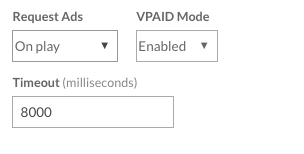Overview: This details how IRIS.TV Adaptive Stream clients can utilize context for Ad Targeting in their Brightcove with IMA3 in-player ad serving.
If you are not an IRIS.TV Adaptive Stream client but are looking to set up Context Ad Targeting, please read the Context Script documentation.
If you are an Adaptive Stream client with Brightcove but are either (a) serving the ads from an on-page or (b) not using IMA3, following the instructions here: Adaptive Plugin Clients Contextual Ad Targeting
Setting Up Contextual Ad Targeting
Contextual Ad Targeting sends contextual segments for a specific video into the pre-roll ad call, which can then be used for direct and programmatic advertising targeting. Contextual data needs to be added by IRIS.TV's Asset IQ system. Please contact your Programming Strategist if you are interested in activating Contextual Ad Targeting for your current Brightcove / IRIS.TV integration.
Contextual Ad Targeting requires the use of the IMA3 ad plugin.
If the player is set-up with autoplay, the first video will not receive context in a pre-roll ad call.
Contextual Ad Targeting can be configured to send context segments in either the "cust_params" or the "categories" parameter on the ad tag. The below documentation will walk through the requirements for both workflows.
To Send Contextual segments through "cust_params":
Add “cust_params” macro to their DFP ad tag
In Brightcove Adveristing settings for the player, disable Request Ads from happening “On Load”.
Add the following to their Brightcove plugin options:
"enable_context_ads" : true, "carousel_recs" : true |
|---|
The publisher must then set up targets to the different “context” values
To Send Contextual segments through "categories" param:
Add “categories” macro to their Telaria ad tag
In Brightcove Adveristing settings for the player, disable Request Ads from happening “On Load”
Add the following to their Brightcove plugin options:
"enable_category_ads" : true, "carousel_recs" : true
The publisher must then set up to targets to the different “categories” values
